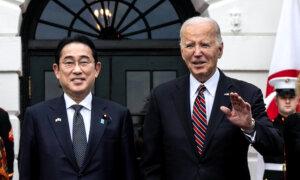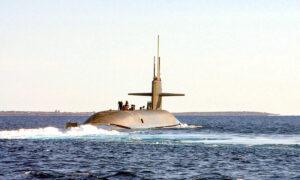It is the biggest upgrade to the alliance since the 1960 Mutual Defense Treaty.
President Joe Biden and Japanese Prime Minister Fumio Kishida will announce the biggest upgrade to the United States-Japan alliance in more than 60 years, according to senior administration officials.
For the first time, the United States will change its force structure in Japan to maximize joint operations in terms of capacity capability and integrated performance, officials said. The United States will also establish a military-industrial council to evaluate where co-production of defense weapons is possible.
Japan’s industrial capacity and strength, which has been on the sidelines since the end of World War II, will finally be unleashed in a bilateral alliance that will help cover what the United States sees as a strategic weak point in terms of its bandwidth for defense production capacity. The two nations would also be partnering on an integrated anti-missile defense system.
“The idea of switching to a multilateral lattice-like architecture is to flip the script and isolate China,” a senior administration official said. Another senior administration official added that Japan’s development is seen as “fundamental validation” of President Biden’s strategy to elevate the role of partners and allies to secure an open Indo-Pacific.”
It is the biggest upgrade to the alliance since the 1960 Mutual Defense Treaty.
On April 7, Japan and the United States joined the Philippines and Australia in a joint naval exercise in the South China Sea.
Over the last three years, U.S. officials noted that Japan has evolved from what America saw as an important regional alliance into one of America’s most important global alliances. They praised the island nation’s efforts to go through the necessary evolution.
The senior administration official also noted, “everywhere that American purpose is being put to the test, Japan is by our side.”
However, the senior officials note that the partnership between the United States and Japan goes beyond military might. The president and prime minister have met more than a dozen times in various capacities. This latest summit between the two leaders will feature 70 deliverables, the largest set for a meeting of this kind. Both sides continue to work on strengthening ties in technology, exploration, and commercial investment.
Japan continues to be one of America’s strongest partners in space exploration, with five separate space agreements already signed through NASA and JAXA, including the International Space Station. The nation is expected to announce a major agreement that makes Japan a full partner in the Artemis moon program.
Greater academic ties are also expected to be announced. For example, at the collegiate level, Carnegie Mellon University and Keio University in Tokyo will engage in joint AI research, funded by several Japanese companies and Microsoft. There will also be $12 million in scholarships announced to fund the transpacific exchange of junior and high school students from both countries.
As its first term nears its end, the Biden administration reaches this milestone with the looming possibility of President Donald Trump’s re-election in November. Nevertheless, administration officials seem confident that the new partnership with Japan will not require another four years under President Biden to become established.
Strengthening bilateral and multilateral relationships with countries willing to lend a hand creates a momentum of its own, they said. Some approaches withstand the test of time, and although the investment carries some risk, nations like Japan trust the United States as “the right kind of counterweight” to an “untethered China.”
Original News Source Link – Epoch Times
Running For Office? Conservative Campaign Consulting – Election Day Strategies!


